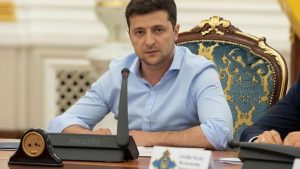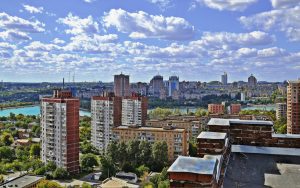
Executive Director of the Ukrainian Institute of Politics Mykola Spiridonov has said, while commenting on the results of a sociology survey conducted by Active Group, that making peace in eastern Ukraine could be the only chance for Ukrainian President Volodymyr Zelensky to complete his presidential tenure successfully.
“Everything has failed. The economy failed, the social policy failed, the foreign policy failed. If Zelensky managed to put an end to the war on the least acceptable terms, he could become a part of history as a successful president. Then everything I have just said about the economy and social policy would be forgotten in 50 years, while the end of the war would be written down in history with capital letters,” Spyrydonov said on the Expert Club YouTube channel.
The political expert said that the government tries to reach a compromise in the settlement of the military conflict in Donbas.
“Zelensky wishes to put an end to the war, but he is not familiar with the instruments. The president doubts. We can set as an example Sivokho, who was appointed and then dismissed under pressure of the nationalist forces,” the expert said.
According to the sociology poll, which was presented by Active Group and Expert Club at the Interfax-Ukraine News Agency on June 22, 2020, some 80% of Ukrainians said that the incumbent government is delaying the end of the war and doing nothing or doing not enough to finish it. Only 6% of respondents said that Zelensky’s team does the utmost under current conditions for this purpose.
The full video is available on the Expert Club YouTube channel:
DONBAS, EXPERT, EXPERT CLUB, EXPERT KITCHEN, PEACE IN DONBAS, POLITICS, SPYRYDONOV

The potential reintegration of Donbas might add up to 1.5 percentage points (pp) to Ukraine’s GDP growth during two or three years, Bank of America (BofA) has said in its analytical review.
BofA said that the potential integration of territories could increase nominal GDP by 3-5 pp and accelerate growth by 1-1.5 pp in the period after the post-war recovery.
The analysts said that the post-war recovery might be partially financed with external donor assistance.
Both Donetsk and Luhansk regions accounted for more than 15.7% of Ukraine’s GDP in 2012, before the war. The contribution of these regions, still under Ukrainian control, fell to about 12.7% of GDP in 2017. BofA believes that this might indicate a one-time increase in relation to nominal GDP values of at least 3%.
According to the analysts, the normalization of economic relations with the region could accelerate the growth of real GDP in the first year by 0.5 pp.

President Volodymyr Zelensky called on Ukraine’s international partners and business representatives to become involved in the implementation of infrastructure and social projects in the Donetsk and Luhansk regions affected by the armed conflict. During his speech at the Ukrainian Lunch in Munich, the head of state said that a global fund had been created to restore the Donbas infrastructure in Ukraine.
“It combines two ‘windows’. The first is for international partners, organizations and foundations. The second is for the Ukrainian fund, which will attract funds from the private sector and individual donors,” the head of state said.
According to the president, the key priorities of the fund are large infrastructure projects, work with local business and its affordable crediting, care for the least protected groups of the population, overcoming the consequences of the war – with a focus on youth, women, children and veterans.
“For the first time such a fund is administered jointly by the World Bank, the Office of the President and the Government of Ukraine,” Zelensky stressed.
In addition, the head of state told about the plans to establish the Ministry of Reintegration and Restoration of Donbas.
“I urge our international partners to join and start fundraising for the reconstruction and reintegration of Donbas together with me,” the president summarized.

Ukrainian President Volodymyr Zelensky has said he has the feeling that elections can be held in Donbas this coming fall simultaneously with local elections across the country; at the same time, he did not rule out that the conflict in Donbas could be frozen.
“Local elections held simultaneously across the country unite it. This is an important symbol for me,” Zelensky said in an interview with Interfax.
“Elections in Donbas are possible only after the military actions there are ended and the foreign armed units are withdrawn,” he said.

Germany will allocate EUR 850,000 in 2020 for humanitarian projects of the charity organization ADRA in Ukraine.
“The assistance will be available to people in eastern Ukraine who are particularly affected by the long-lasting conflict. From 2016 to 2019, ADRA’s work was already funded from Germany at EUR 4.6 million. In addition, ADRA will contribute an additional EUR 200,000 from its own funds,” the press service of the German Embassy in Ukraine reports.
The funds will be used to help older people, people with disabilities, single parents, large families, and among them, internally displaced persons. ADRA also plans to improve the humanitarian protection and psychosocial health of victims of conflict with post-traumatic syndrome, among whom there are many children, and provide access to basic services (especially medical and social services) and drinking water. Also, social transport services will be offered to people in need.
ADRA Ukraine is part of the worldwide ADRA network and has been operating in Ukraine since 1993. During its performance, the organization has implemented about 150 assistance projects in 12 regions of Ukraine. After the outbreak of hostilities in eastern Ukraine in 2014, the organization concentrated its activities in Donetsk and Luhansk regions.

In November, the German-Ukrainian Fund (GUF) will present a new FinancEast program to support micro–, small and medium-sized enterprises (MSMEs) in the government-controlled territories of Donetsk and Luhansk regions, under which it is planned to reimburse up to 50% of the cost of investment projects of enterprises, GUF Executive Director Valeriy Mayboroda has said.
“This program is also co-financed by the EU and its amount is EUR9.5 million,” Country Manager to Ukraine of the KfW Development Bank Kurt Strasser said at a GUF press event in Kyiv on Wednesday.
According to him, these will be subsidies to help medium- and small-sized enterprises that lack access to money over the difficult economic situation, as well as those who are located in the Donbas region.
The FinancEast program is co-financed by the EU through KfW, the GUF Executive Director said.
“The stage of the finalization of contracts and operational guidelines is nearing completion, and from November we will begin the active phase of its implementation,” Mayboroda said.
FinancEast materials indicate that investment projects for MSMEs are medium- and long-term ones for more than 12 months that are related to the purchase, modernization or reconstruction of fixed assets. Under an investment project, financing of current assets up to 20% of its value is allowed.
In 2019, the assets of a current program for lending SMEs in the national currency, which is designed until 2030, grew to EUR14.7 million, or 47%, since the launch of the project in 2017. This program is implemented by the GUF and financed by KfW and the EU.
Since the beginning of the project, 217 enterprises have been funded for a total of about UAH 710 million with an initial budget of the program being UAH 370 million. The average rate is 15.5% per annum. According to Mayboroda, the financial resource of the program was used twice due to the reuse of returned loans.
Partners under the GUF’s program are Kredobank, Ukrgasbank, ProCredit Bank and Bank Lviv. The GUF’s Executive Director said that negotiations with CreditWest Bank were also ongoing on its joining the program.